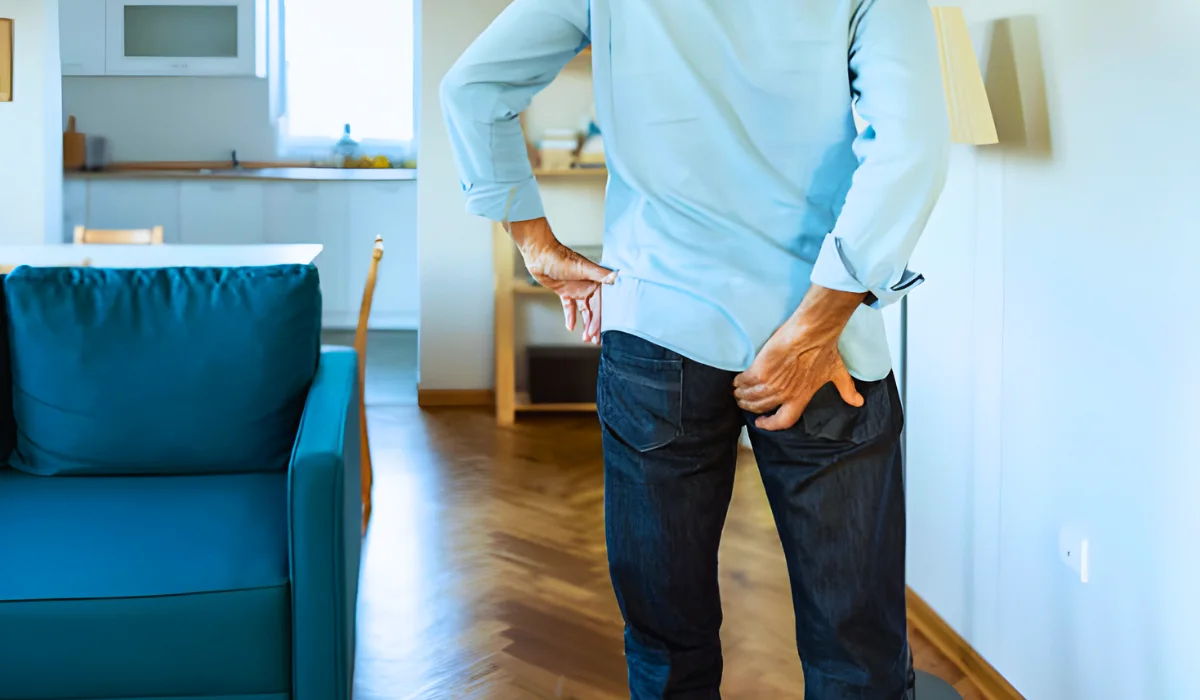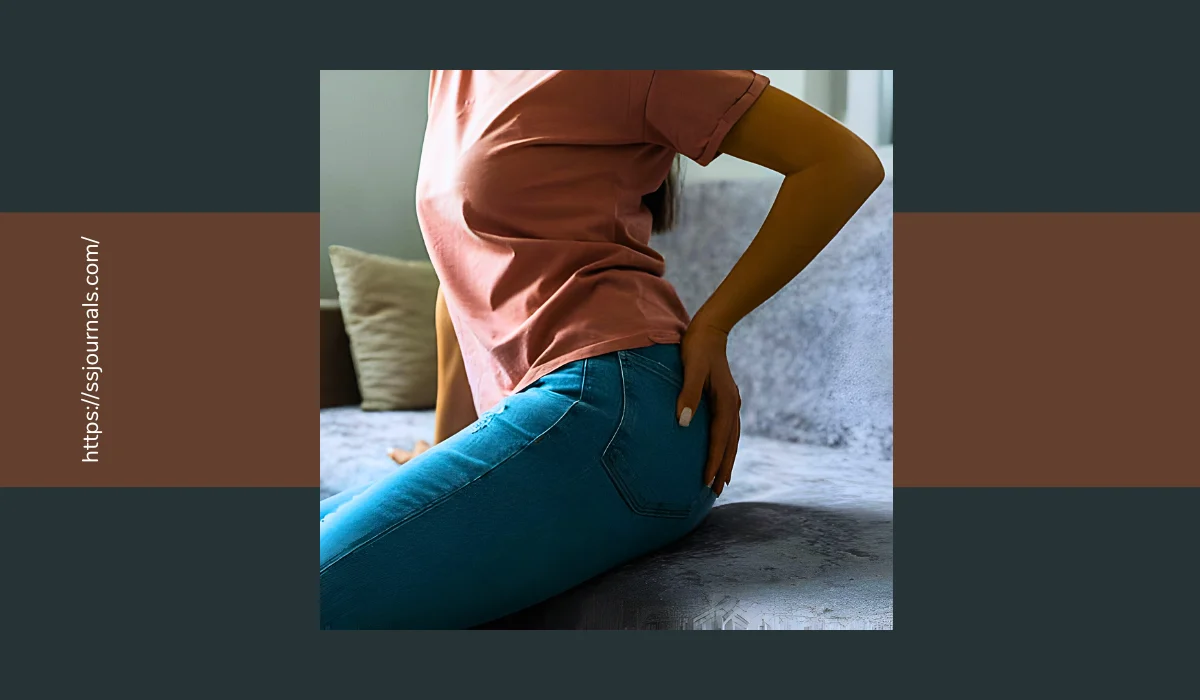It’s the end of a long workday and you’re looking forward to finally sitting down and relaxing. But as soon as your butt hits the couch or chair, an unpleasant feeling sets in. Your rear end starts to ache or feel numb and uncomfortable. Why does my butt hurt when I sit for too long? This annoying and common problem has several potential causes.
Sitting for prolonged periods can irritate the sciatic nerve, a major nerve running from the lower back, through the butt, and down the legs. Sciatica often leads to butt hurts when sitting.
Another possible culprit is the piriformis muscle located deep in the buttocks. If it’s tight or spasming, it can pinch the sciatic nerve, causing similar discomfort. Sometimes chronic butt hurts when sitting is a sign of “dead butt syndrome,” resulting from a sedentary lifestyle and weakened glute muscles. Understanding what’s behind your sore rear can guide you to solutions.
Why does my butt hurts when sitting?
Prolonged sitting
Prolonged sitting is hard on your backside for several reasons. When you sit for long periods, such as working at a desk job, pressure builds in your pelvis and butt. The piriformis muscle and sciatic nerve also get compressed.

This irritation is why your butt goes numb after sitting too long. If you don’t regularly get up, stretch, and move around to relieve the pressure, you’re likely to suffer pain when your butt hurts when sitting.
Improper posture while sitting can make the problem worse. Slouching doesn’t distribute weight evenly across your pelvic bones and glutes. This makes some areas sag and others tense up.
Sciatica piriformis
Sciatica piriformis refers to irritation of the sciatic nerves branching from the lower spine, through the buttocks, to the legs. One potential cause is the piriformis muscle squeezing or spasming against the nerve.
Spasms often result from overly tight or weak glute and hip muscles. Piriformis syndrome can make your butt ache, tingle, or feel “hot” when your butt hurts when sitting. The muscle cramps can range from mild to painfully severe.
Sciatic pain usually occurs on just one side and may shoot down the back of your thigh. Prolonged sitting tends to aggravate piriformis syndrome. Standing and walking relieve the cramping.
Dead butt syndrome
Another common reason sitting makes your butt sore is a weak and inactive posterior chain – your glutes, hamstrings, and lower back muscles. A lack of conditioning causes these muscles to stiffen and ache easily.
Regular exercise keeps them flexible and resilient. But too much sitting with poor posture lets them get tight and weak. Physical therapists have dubbed this phenomenon “dead butt syndrome.” The discomfort starts in a “dead,” numb sensation in your bum.
If you try to get up or sit back down, the pain will shoot through your hips and glutes. Weak glutes throw off your gait, alignment, stability, and balance too. The aches tend to get worse with prolonged sitting.
Chronic compression from sitting can even lead to actual tissue damage over the years. This shows up as numb, painful thickened spots on your butt. Doctors refer to this as a deep gluteal syndrome.
It mostly arises from workplace conditions requiring excessive sitting. Truck drivers, office workers, and others who sit for over 95% of their workdays face higher risks. The syndrome involves injured nerves, fascia, muscles, and connective tissues. You may feel the knotted damaged spots when rubbing your rear. Treatment focuses on improving circulation and flexibility through regular movement and targeted exercise.
skeletal misalignment
Another reason behind butt pain when sitting is a skeletal misalignment in the pelvis and spine. Imbalances here throw surrounding muscles and joints out of whack too. A chiropractor can evaluate your posture and alignment issues.
Gentle manipulation combined with a personalized exercise plan helps rebalance the area. Proper alignment takes the pressure off compressed nerves and sore spots. One technique chiropractors employ is sacroiliac joint manipulation.
The sacroiliac joints connect your spine and hip bones. When these joints get twisted, the surrounding tissues suffer. This includes the piriformis muscle which then irritates the sciatic nerve.
Also Read: Best Butt Fat Burning Exercises – 4 Ways To Lose Stubborn Butt Fat
Conclusion
If your butt constantly hurts when sitting, don’t ignore it. Look at how long you generally sit each day between standing or walking breaks. Evaluate your go-to sitting positions as well. For instance, slouching to one side while working on a laptop can strain muscles.
Make simple adjustments like sitting up straighter with feet firmly on the floor. If that doesn’t provide relief, try using a standing desk or exercise ball instead of a chair. Stretch your hips, glutes, and hamstrings regularly too. This keeps tissues supple so they tolerate compression from sitting better.
See your doctor about persistent or severe butt hurts when sitting. They can pinpoint causes like sciatica or piriformis syndrome. Physical therapy often effectively treats these issues through targeted stretching, massage, and strengthening exercises.
Lifestyle measures like losing weight, sitting smarter, and staying active help too. In some cases, injections or surgery may be warranted for nerve impingement or muscle problems. However, conservative self-care and physical therapy should be attempted first.
Sitting less overall can prevent a sore, aching butt as well when your butt hurts when sitting. Take frequent breaks to walk around even for a couple of minutes each hour. Switch between sitting and standing throughout your day.
Maintaining strong glutes and a flexible posterior chain will decrease the risks of developing “dead butt syndrome” too. So make time for regular hip, leg, and glute workouts like squats or lunges. Simple stretching will also keep your backside more resilient as you sit.
Pay attention to warning signs from your body and adjust positions often. Implementing healthy movement habits will have you sitting pretty comfortably.
What causes your bum discomfort when seated – prolonged sitting habits, sciatica, or weak glutes? Getting to the bottom of the issue is the first step toward relief!

